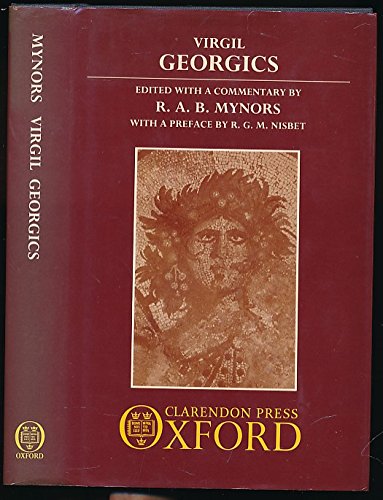
Synopsis
Virgil's Georgics, considered to be one of the great poems of Western literature, is ostensibly a didactic poem on agriculture. Challenging this idea, the late Sir Roger Mynors argues that the poem's true subject is humanity and its place in nature and society. The poem is also a landmark in the use of the natural world as material for literature and of special interest because the poet draws not only on his own experience but also on his wide reading of Greek poetry. This commentary examines Virgil's meaning and choice of expression to provide a fuller understanding of the poetry.
Les informations fournies dans la section « Synopsis » peuvent faire référence à une autre édition de ce titre.
Présentation de l'éditeur
This volume and its companion volume devoted to the second half of the poem provide a detailed commentary, with text, on the whole of Virgil's Georgics. Professor Thomas describes this work as 'perhaps the most difficult, certainly the most controversial, poem in Roman literature'. He presents the Georgics as the finished poem of Virgil's mature years, approaching it not merely as a part of the tradition of didactic poetry, but rather as a work which confronts, behind its generic appearance, issues not essentially different from those which inform the Eclogues and Aeneid. His introduction and Commentary argue that Virgil's agricultural world, with its successes, failures and ultimate limitations, represents the arena for man's struggle with the realities of existence. Professor Thomas pays particular attention to Virgil's allusion to and reshaping of prior Greek and Latin poetry. The Introduction also covers stylistic, metrical and structural questions. A subject index and indexes of important Greek and Latin words conclude each volume. This edition is aimed primarily at students at university and in the upper forms of schools, but the range of its scholarship means that it will be valuable to all classical scholars. The Introduction contains material for non-classicists interested in Latin literature.
Biographie de l'auteur
Eminent Roman poet, Virgil is famous for his incomparable epic Aeneid which has greatly influenced literature through the ages. Son of an affluent landowner, Virgil was sent to Milan, Rome and Naples to study rhetoric, mathematics, and medicine. He became one of the ''Alexandrians" - a group of poets influenced by Greek bards of the 3rd century. His early works include the poetic collection Bucolica (37 B. C.; 10 books), and the informative Georgics (29 B. C.; 4 books). After the Battle of Actium in 31 B. C. Virgil was assigned by the victorious emperor Augustus to write about his rule. This resulted in his magnum opus Aeneid on which he worked from 30 to 19 B. C. Spread over 12 books; it vividly captures the splendour of the Roman Empire and made Virgil a legend.
Les informations fournies dans la section « A propos du livre » peuvent faire référence à une autre édition de ce titre.
Autres éditions populaires du même titre
Résultats de recherche pour Georgics
Georgics
Vendeur : Better World Books Ltd, Dunfermline, Royaume-Uni
Etat : Very Good. Ships from the UK. Former library book; may include library markings. Used book that is in excellent condition. May show signs of wear or have minor defects. N° de réf. du vendeur 52151385-20
Acheter D'occasion
Quantité disponible : 1 disponible(s)
Georgics
Vendeur : WorldofBooks, Goring-By-Sea, WS, Royaume-Uni
Hardback. Etat : Very Good. The book has been read, but is in excellent condition. Pages are intact and not marred by notes or highlighting. The spine remains undamaged. N° de réf. du vendeur GOR014218054
Acheter D'occasion
Quantité disponible : 1 disponible(s)
Georgics
Vendeur : Object Relations IOBA PBFA, London, Royaume-Uni
Hardcover. Etat : Very Good. Etat de la jaquette : Very Good. 1st Edition. 1st printing (1990). 345pp. VG/VG copy, binding square and tight, cloth covers clean and bright, small mark to top page edge, small ink name on front pastedown obscured by jacket flap, otherwise internally excellent, jacket has small nick to front fore edge, now preserved in archival jacket protector. N° de réf. du vendeur 024125
Acheter D'occasion
Quantité disponible : 1 disponible(s)
Georgics
Vendeur : Phatpocket Limited, Waltham Abbey, HERTS, Royaume-Uni
Etat : Good. Your purchase helps support Sri Lankan Children's Charity 'The Rainbow Centre'. Ex-library, so some stamps and wear, but in good overall condition. Our donations to The Rainbow Centre have helped provide an education and a safe haven to hundreds of children who live in appalling conditions. N° de réf. du vendeur Z1-N-005-00822
Acheter D'occasion
Quantité disponible : 1 disponible(s)
VIRGIL: GEORGICS Edited with a Commentary
Vendeur : Ancient World Books, Toronto, ON, Canada
Hardcover. Etat : Fine. Etat de la jaquette : Near Fine. Minor shelfwear to DJ. ; 345 pages. N° de réf. du vendeur 40253
Acheter D'occasion
Quantité disponible : 1 disponible(s)
Virgil's Georgics
Vendeur : Lacey Books Ltd, Cirencester, Royaume-Uni
Hardcover. Etat : Good. 1990 Clarendon hardcover edition. Some reading wear, inscription to endpaper else good condition. N° de réf. du vendeur SI-7FF7-QZAI
Acheter D'occasion
Quantité disponible : 1 disponible(s)

